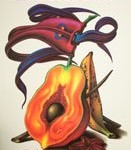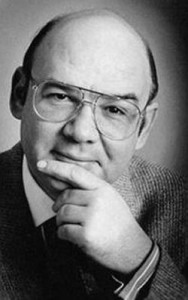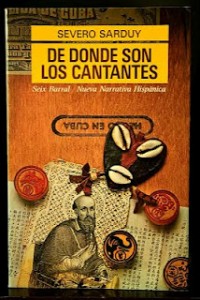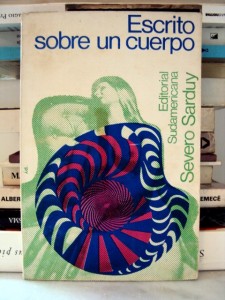SEVERO SARDUY, POET, AUTHOR, PLAYWRIGHT.
Severo Sarduy (Camagüey, Cuba; February 25, 1937 – Paris; June 8, 1993) was a Cuban poet, author, playwright, and critic of Cuban literature and art.
Sarduy did the equivalent of high school in Camagüey and in 1956 moved to Havana, where he began a study of medicine. With the triumph of the Cuban revolution he collaborated with the Diario libre and Lunes de revolución, pro-marxist papers. In 1960 he traveled to Paris to study at the Ecole du Louvre. There he was connected to the group of intellectuals who produced the magazine Tel Quel, particularly to philosopher François Wahl, with whom he was openly involved. Sarduy worked as a reader for Editions du Seuil and as editor and producer of the Radiodiffusion-Télévision Française. In 1972 his novel Cobra won him the Medici Prize.
He was among the most brilliant essayists writing in Spanish and “a powerful baroque narrator, full of surprising resources.”. As a poet, he was considered one of the greatest of his time. He was also a more or less secret painter; a major retrospective of his work was held at the Reina Sofía Museum of Madrid after his death. He died due to complications from AIDS just after finishing his autobiographical work Los pájaros de la playa.
Along with José Lezama Lima, Virgilio Piñera, and Reinaldo Arenas, Sarduy is one of the most famous Cuban writers of the twentieth century; some of his works deal explicitly with male homosexuality and transvestism.
Sarduy was one of the most outrageous and baroque of the Latin American Boom writers of the sixties and seventies, and here bound back to back are his two finest creations. Cobra (1972) recounts the tale of a transvestite named Cobra, star of the Lyrical Theater of the Dolls, whose obsession is to transform his/her body. She is assisted in her metamorphosis by the Madam and Pup, Cobra’s dwarfish double. They too change shape, through the violent ceremonies of a motorcycle gang, into a sect of Tibetan lamas seeking to revive Tantric Buddhism.
Maitreya (1978) continues the theme of metamorphosis, this time in the person of Luis Leng, a humble Cuban-Chinese cook, who becomes a reincarnation of Buddha. Through Leng, Sarduy traces the metamorphosis of two hitherto incomparable societies, Tibet at the moment of the Chinese invasion, and Cuba at the moment of revolution. Transgressing genres and genders, reveling in literal and figurative transvestism, these two novels are among the most daring achievements of postmodern Latin American fiction.
Entrevista a Severo Sarduy (Spanish)
Bibliography
Gestos. 1963. Novel.
De donde son los cantantes. 1967
Escrito sobre un cuerpo. 1969. Essays
Flamenco. 1970. Poems.
Mood Indigo. 1970. Poems.
La playa. 1971. Pieza radiofónica / radio play.
La caída. 1971. Pieza radiofónica / radio play.
Relato. 1971. Pieza radiofónica / radio play.
Los matadores de Hormigas. 1971. Pieza radiofónica / radio play.

Flamenco. 1971. Poems
Mood Indigo. 1971. Poems
Cobra. 1972. Novel.
Barroco. 1974. Essays
Para la voz. 1977. Radio Plays (“La playa,” La caida,” Relato,” and “Los matadores de Hormigas”)
Big Bang. 1974. Poems
Maitreya. 1978. Novel.
Daiquiri. 1980 . Poems
La simulación. 1982.Essay.
Colibrí. 1984. Novel.
Un testigo fugaz y disfrazado. 1985 Poems
El cristo de la Rue Jacob.1987. Essays
Nueva inestabilidad. 1987. Essays
Ensayos generales sobre el barroco. 1987. Essays
Cocuyo. 1990. Novel.
Pájaros de la playa . 1993. Published posthumously just one month after his death.
Obra Completa, Two volumes. 1999. Edited by Francois Wahl. Unesco. Paris.
Agencies/Wiki/RobertoGonzález/InternetPhotos/YouTube/TheCubanHistory.com
THE CUBAN HISTORY,HOLLYWOD.
Arnoldo Varona, Editor.






